LONDON (Reuters) - Britain will set out on Wednesday its aim to work closely with the European Union on space exploration, nuclear research and on developing medicines after Brexit, part of efforts to move talks on to discuss their future relationship.
In its latest paper outlining the government's vision for ties after it leaves the bloc in March 2019, Britain will set out examples of where countries outside the EU still participate in programmes such as Galileo, the European GPS, and Copernicus, developing information services based on data from satellites.
By setting out what it calls "future partnership papers", Britain wants to push Brexit talks forward, moving from negotiations on a divorce settlement to a wider discussion on future ties and has called on the EU to be more flexible.
EU officials say they cannot discuss the future until "sufficient progress" has been made on three priority areas - the rights of expatriates, Britain's border with EU state Ireland and a financial settlement.
Brexit minister David Davis described continued research cooperation as crucial for creating "a global Britain" - a catchphrase used repeatedly by Prime Minister Theresa May to describe the country's future outside the EU.
"A global Britain must be a country that looks to the future. That means being one of the best places in the word for science and innovation," Davis said in a statement.
"This paper sends a clear message to the research and innovation community that we value their work and we feel it is crucial that we maintain collaboration with our European partners after we exit."
The paper is the fifth to outline the government's vision for a future partnership and the latest to suggest Britain wants to retain much of its current relationship with the EU while escaping its court and what it calls "huge" payments.
It touches on Britain's future ties with the European Atomic Energy Community (Euratom), a body it says it must leave after Brexit. Experts fear the departure could increase costs, delay new nuclear power projects, and complicate research.
The government says projects on nuclear research, such as JET (Joint European Torus), a fusion research facility funded by the Euratom Research and Training programme, supports jobs in Britain. The country's space sector is worth over 11.8 billion pounds, the paper says.
"From space exploration and developing better and safer medicines, to nuclear fusion research, the UK and Europe have a long history of close collaboration to meet the world's great challenges," Science Minister Jo Johnson said.

"It's in our mutual benefit to maintain this successful partnership, and this paper clearly outlines our desire to have a full and open discussion with the EU to shape our joint future."